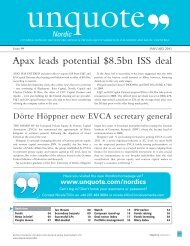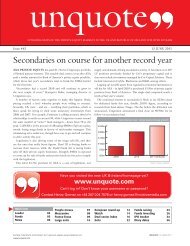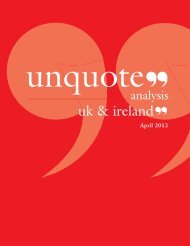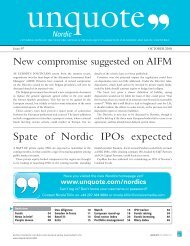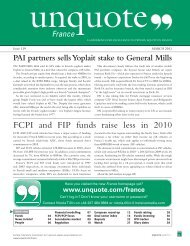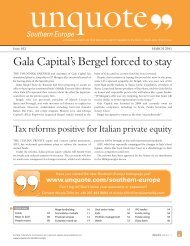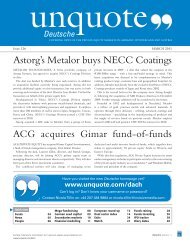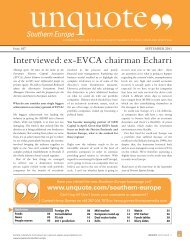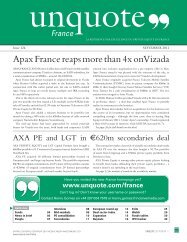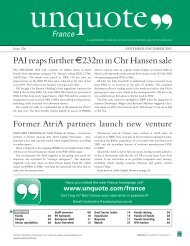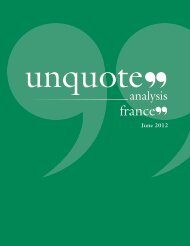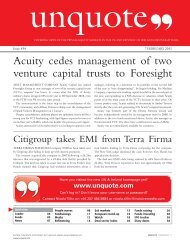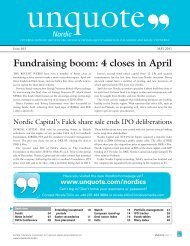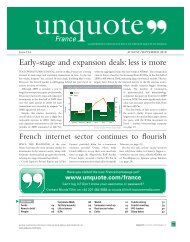latest digital edition of UK & Ireland unquote
latest digital edition of UK & Ireland unquote
latest digital edition of UK & Ireland unquote
Create successful ePaper yourself
Turn your PDF publications into a flip-book with our unique Google optimized e-Paper software.
£0.83<br />
to the euro on 3 February, only a cent<br />
less than this time last year<br />
<strong>unquote</strong>.com/analysis<br />
20<br />
Seen from the <strong>UK</strong>, speculation over the euro’s future could<br />
benefit sterling funds. But euro-denominated vehicles are<br />
enduring well, following a strong 2011. Greg Gille reports<br />
Euro crisis sparing<br />
Continental funds<br />
THE ONGOING eurozone crisis is a concern<br />
on the mind <strong>of</strong> many PE players, potentially<br />
threatening access to financing and the growth<br />
prospects <strong>of</strong> portfolio companies. But, in what could prove<br />
to be a controversial view, Dunedin chief executive Ross<br />
Marshall foresees that it<br />
could be trouble for eurodenominated<br />
funds.<br />
“There does not seem to<br />
be any conceivable way that<br />
the euro can survive in its<br />
current form, so we hope<br />
that there is an orderly<br />
break-up, rather than a<br />
disorderly one, to resolve<br />
the eurozone crisis,” said Marshall, while commenting on the<br />
<strong>UK</strong> mid-market firm’s outlook for 2012.<br />
Euro funds still attractive<br />
“We’re just delighted that our existing funds are sterlingdenominated<br />
and not euro-denominated – LPs will be asking<br />
GPs what will happen when the euro collapses,” he added.<br />
“This, however, will create opportunities for well-managed,<br />
well-capitalised businesses like our portfolio companies that<br />
are relatively un-leveraged, so that they can take advantage <strong>of</strong><br />
the opportunities that will inevitably arise.”<br />
Dunedin’s <strong>latest</strong> vehicle, Dunedin Buyout Fund II, closed<br />
on £250m in September 2006. It is around 75% invested.<br />
Needless to say, not everybody in the industry will share<br />
this outlook, both with regards to the euro’s future and the<br />
current appetite for euro-denominated vehicles.<br />
“Despite what some Anglo-Saxon industry participants<br />
might foresee, I don’t think the euro is due to collapse,” a<br />
global placing agent told <strong>unquote</strong>”. “What we are witnessing<br />
at the moment is that continental LPs largely prefer eurodenominated<br />
funds over their sterling counterparts. First<br />
<strong>of</strong> all, it is their own currency, which helps when balancing<br />
assets and liabilities. But the euro has stood up remarkably<br />
well despite the crisis, which<br />
reassures investors.<br />
“We are currently raising<br />
several euro funds, and they<br />
are doing extremely well. I<br />
would even say that today,<br />
both European and non-<br />
European investors would<br />
rather invest in Germany<br />
than in the <strong>UK</strong>,” he added.<br />
“Today, both European and non-<br />
European investors would rather invest<br />
in Germany than in the <strong>UK</strong>”<br />
Global placement agent<br />
<strong>UK</strong> losing headway<br />
Fundraising activity in 2011 certainly reflected a shift in the<br />
European fundraising landscape compared to the previous<br />
year. The <strong>UK</strong> dominated the market in 2010, making up<br />
59% <strong>of</strong> fundraising activity in value – this figure dropped to<br />
23% last year, with France closing the gap (18% against 5%<br />
in 2010) and the Nordic countries surging to attract a third<br />
<strong>of</strong> all commitments in European funds.<br />
Regardless <strong>of</strong> currency issues, Marshall also forecast a<br />
tough year ahead for GPs wanting to hit the fundraising<br />
trail in 2012: “Nobody is under any illusion that<br />
fundraising will be easy. There are more than 1,800<br />
funds currently in the market and most <strong>of</strong> them will not<br />
succeed. Key factors will include how the GP performed<br />
through the 2009 recession; the stability <strong>of</strong> the team; how<br />
differentiated and repeatable is the investment approach;<br />
and successful exits!” <br />
Issue 1 — February 12



